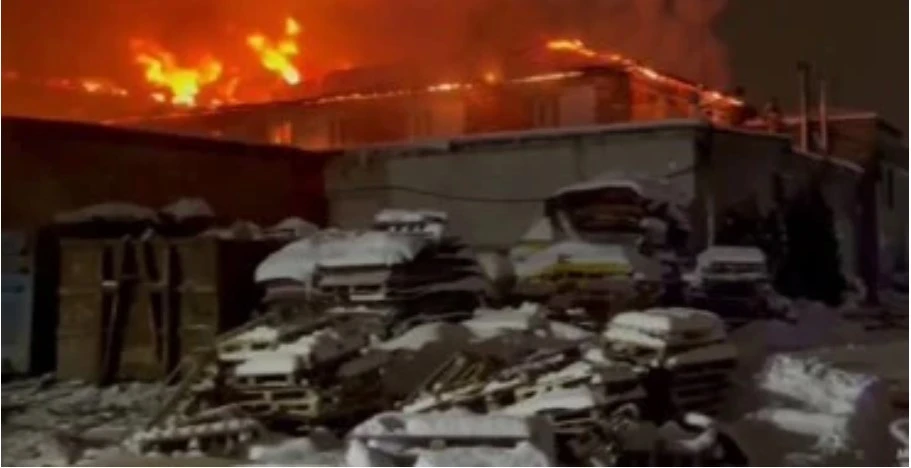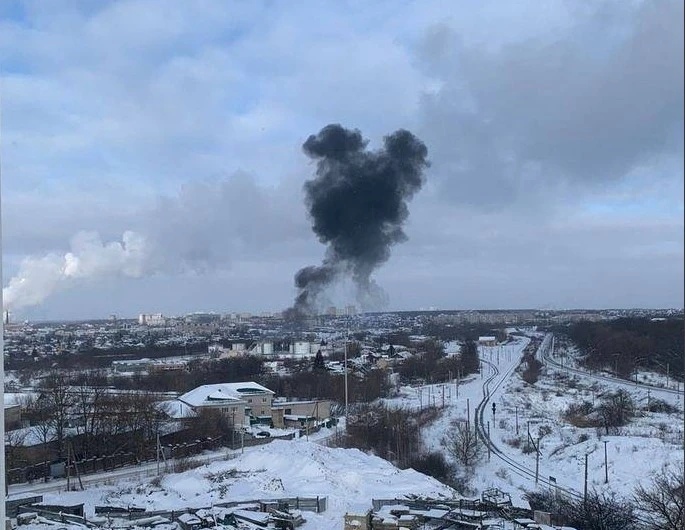
Fire in St. Petersburg, accident on Trans-Baikal Railway, explosions in Mariupol: Where Russians witnessed blasts last week
This week, St. Petersburg experienced a large-scale fire, as well as Moscow, while 14 cars of a freight train derailed on the Trans-Baikal Railway and explosions were also heard in the occupied territories
Read more about explosions in Russia and the temporarily occupied territories in Espreso's weekly review.
Large-scale fire in St. Petersburg, blackout in Rostov-on-Don, fire in Moscow, and accident on the Trans-Baikal Railway
- Russia. The Trans-Baikal Railway/ 14 freight train cars derailed between Aleur and Bushulei. According to reports, the adjacent tracks were damaged, and passenger trains traveling on the Moscow-Vladivostok and Chita-Blagoveshchensk routes were halted. The Russian railway's office clarified that the "middle part of the locomotive" of a freight train traveling empty collided with the cars of a train loaded with coal. As a result of the accident, train traffic in both directions was blocked. The cause of the incident has not been disclosed yet, and there are no reported casualties.
- A large-scale fire occurred at a polymer production facility in the Moscow region, followed by reports of another fire in Moscow. According to the Russian Ministry of Emergency Situations, the roof of a polymer production workshop in the town of Obukhovo was on fire, covering an area of 8,000 square meters. Later, Russian firefighters reported a fire in Moscow, affecting an area of 2,000 square meters. To extinguish the flames, a firefighting train was deployed.
-
On the evening of Saturday, January 13, there were widespread power issues in the Russian city of Rostov-on-Don. According to the information from the company Komservis, streets such as Magnitogorskaya, Zavodskaya, Zvyozdnaya, and part of the Zapadnoy district experienced power outages. Russian municipal services promised to restore electricity within 2-3 hours but provided no guarantees. Later, it was revealed that there was also a power outage in the Proletarsky district, in buildings near the old airport. “Rosseti implemented a schedule of temporary power restrictions," the company Donenergo commented on the situation.
-
The Russian air-launched cruise missile Kh-101, intended for an attack on Ukraine on January 13, did not reach its destination point and crashed on the territory of Krasnodar Krai, Russia. It was reported that there were no apparent damages or casualties at the crash site. However, as a precaution and to conduct special measures, the movement along the road section between the Leningradskaya and Pavlovskaya stations was temporarily blocked for safety reasons.
-
On January 13, Russia's activities didn't conclude as a significant fire erupted at the Wildberries marketplace warehouse in St. Petersburg. Reports indicated that the fire covered an area of 50,000 square meters in the warehouse complex. Approximately 270 people and 57 units of equipment from the Russian Ministry of Emergency Situations were involved in extinguishing the fire. It was also noted that at least 1000 people were in the warehouse at the time of the incident, which occurred during a shift change. The warehouse primarily stored clothing. Later, a source from RBC-Russia informed journalists that one of the preliminary theories being considered for the cause of the fire was intentional arson of the warehouse complex.

Photo: Russian Emergencies Ministry
Attacks on Belgorod, drones in Oryol, fire in the bathhouse of Russian military personnel in Kursk, and explosions in temporarily occupied Berdyansk and Mariupol
-
The Belgorod authorities reported new incidents. On the evening of January 8, air defense systems allegedly shot down 10 aerial targets “approaching the city.” According to Gladkov, windows were shattered in two residential buildings, three cars were damaged by debris, and four trucks caught fire. He also mentioned three injured individuals - a woman wounded in the back, a man with shrapnel injuries to the chest, forearm, and back, and another resident with injuries to the chest and arm.
-
Meanwhile, kamikaze drones attacked the territory of the Orelnefteprodukt oil base in the Russian city of Oryol, resulting in three casualties. In the neighboring Kursk, three UAVs were reportedly shot down, and one in Bryansk. Governor Andrey Klichkov reported this on Telegram, stating, “Two unmanned aerial vehicles crashed on the fuel and energy complex in the city of Oryol. The fire was quickly localized, and necessary assistance was provided.” According to Baza, three people were injured due to the drone crashes, suffering shrapnel wounds. Klichkov later added that a third drone “fell” onto a non-residential object in the Oryol municipal district. However, pro-government Telegram channels claimed that the reservoir was empty and that there were no casualties. The first drone caused no significant consequences, but a fire broke out after the second one hit. Photos showed a column of smoke rising into the sky. Around 2 pm, the governor of the neighboring Kursk region, Roman Starovoit, announced the operation of air defense systems. A few minutes later, he added that three drones were shot down in the sky over the region, followed by another one. The governor also noted that one person died in the incident.
-
On the morning of January 10, the Ministry of Defense of the Russian Federation reported an alleged drone attack on the Saratov region. Russian media outlets state that there were two UAVs, and they crashed at the military airfield Engels 2.
-
In the Kursk region of Russia, near the border with Ukraine, a field bathhouse used by Russian military personnel caught fire. Two mobilized individuals lost their lives, and two conscripts were injured. Preliminary information suggests that the fire started from the wall ignition near the stove in the field bathhouse.
-
On January 11, in the Russian city of Novosibirsk, two districts were left without heating and hot water due to a burst pipe. The temperature in the city at that time was -15 °C, dropping to -25 °C overnight when the incident occurred. Hospitals and clinics in the affected areas suspended admissions. It was also reported that tram tracks were damaged as they were flooded with hot water.
-
On the morning of January 11, the Russian Ministry of Defense accused Ukraine of allegedly conducting drone attacks in three regions. It was stated that Russian air defense forces purportedly destroyed three UAVs over the territories of the Rostov, Tula, and Kaluga regions.
-
On the morning of January 13, powerful explosions were reported in the center of the temporarily occupied Berdyansk in the Zaporizhzhia region. According to Mariupol Mayor's Advisor Petro Andriushchenko, smoke was rising from the area near the commandant's office and from Primorska Square. Later, another explosion occurred in the city center, after which the Russian appointees activated the air raid alarm. Additionally, as reported by the mayor's advisor, explosions were heard in Mariupol in the morning. Russians used anti-aircraft defense. Later, Andriushchenko wrote that in the occupied Mariupol, there were preliminary indications of an impact on the Russian barracks: "The consequences of the explosion in Mariupol. Preliminary, a hit to the occupiers' barracks at the Illich Iron and Steel Works near the 3rd Depot. It is quite possible that it was hit by the fragments of their own air defense system." According to him, after this incident, the Russian invaders began mass relocation of personnel and equipment to the Primorsky district of Mariupol. In Berdyansk, preliminary information suggested an impact in the Berdyansk port, which the occupying forces use as a military base.

Expert opinions
Political analyst Alexander Antoniuk believes that as long as the war takes place exclusively on the territory of Ukraine, we will always be in unfavorable conditions.
"The Belgorod raid is a kind of presentation of the capabilities that should be available on the territory of the Russian Federation. In order to move the war to Russia, it is necessary to destroy legitimate military targets with aircraft, drones, artillery and long-range missiles. As long as the war is fought exclusively on the territory of Ukraine, we will always be at a disadvantage," Antoniuk said.
Meanwhile, British intelligence explains the possible reasons for the fall of aviation munitions on the territory controlled by Russia during attacks on Ukraine. The most likely factors are inadequate preparation and fatigue of the crew during the execution of such missions.
"Russia's continued propensity for munition accidents is likely exacerbated by inadequate training and crew fatigue, leading to poor execution of tactics during missions," the British Ministry of Defence emphasizes.
- News













































